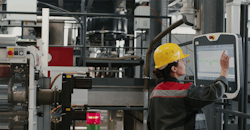New Poll: Manufacturers Leading on Sustainability
The manufacturing industry continuously plans for the future. By nature, its engineering orientation primes it for innovation and improvement. Of necessity, manufacturers must stay efficient, seeking to eliminate waste and defects.
Perhaps that's why, when it comes to sustainability, manufacturers are among the most engaged and optimistic businesses. In a recent global Harris Poll survey of leaders across industries commissioned by Google Cloud, manufacturing executives expressed the greatest optimism in their company's commitment, and reported the highest rates of recycling, office sustainability practices, and efforts to offset their carbon footprint
- 56% report they’re taking steps to operate more sustainably (the highest of any industry polled and compared to a 45% global average across industries).
- 57% are implementing sustainable office policies like automatic lights, water bottle stations, reusable utensils, and paperless transactions (the highest of any industry polled and compared to a 48% global average across industries).
- 55% are designing products and offerings with sustainability in mind (the highest of any industry polled and compared to a 44% global average across industries)
They were also the greatest optimists about the ability of technology to assist in developing more sustainable products and services, measuring impact, reducing environmental impacts, and developing industry transformations that enable greater sustainability.
- 55% say that technology enables development of new products and services that leverage more sustainable methods (the highest of any industry and compared to a 44% global average across industries).
- 55% report that technology enables automation or outsourcing business operations to improve sustainability (the highest of any industry polled and compared to a 43% global average across industries).
- 52% report that technology allows them to measure and report the impact of their efforts using automated data collection, for example (the highest of any industry polled and compared to a 44% global average across industries).
My work at Google Cloud has taught me much about what makes manufacturers so engaged and optimistic about sustainability. Put bluntly, they are obsessed with data, and measure every aspect of their processes, every interaction, to understand better how things work, and how they can be improved. Manufacturing is also exceptionally concentrated, when it comes to things like energy and water consumption, so it's already possible to measure a great deal of activity, and understand the efficiency of different interactions. That is the basis for improvement.
Manufacturers from around the world will soon gather at Hannover Messe 2022, an industry gathering with the theme of protecting the environment by reducing CO2 emissions. It will focus on areas like digitization of production processes, renewable energy, Artificial Intelligence, automation, and sustainable office practices. In all, we will demonstrate and discuss ways that the methods of the Industrial Era can be adapted in the Digital Age for outcomes that are both less costly and more sustainable for the planet.
We see great gains in the future, based on the way manufacturers use data.
At Google Cloud, for instance, we recently introduced a manufacturing data engine consisting of a common data model for a wealth of different inputs, like images, telemetry, and machine performance. A common format can enable rapid insight not only to individual parts of a manufacturing process, but to the interactions among different parts.
In addition, we introduced a supply chain digital twin, which can capture, model and affect complex systems. It enables users to prototype and plan for new and more efficient supply chains.
In both cases, seeing the effects of interactions with greater precision can cut energy usage and minimize waste.
One of the interesting effects of working on these new "systems" views of data analysis is we can more clearly see the individual behavior of each machine, each mode of transport and each component input. Thus, the digital world improves both the overall sense of operations, and the particular view of each part.
I mentioned earlier that manufacturers lead in capability and enthusiasm for improving sustainability because their use of resources is highly concentrated compared with many other industries. They can see more. As digital industries build out new and more comprehensive systems of understanding, the benefits of seeing more will likely accrue to many other sectors, like transportation, healthcare and the delivery of government services. Thus, the work of digital manufacturing pioneers can have effects far beyond their industry. We're only getting started, and can’t wait to show what’s next.
Charlie Sheridan is technical director, Manufacturing Industry Solutions, Google Cloud.
